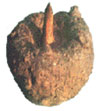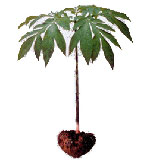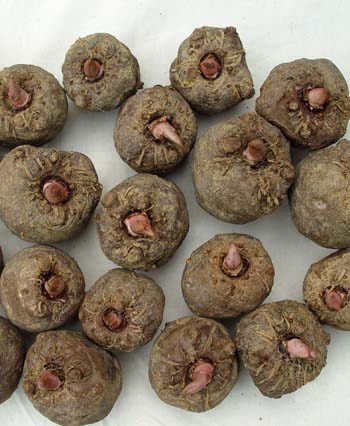Health Benefits of the Konjac
Glucomannan Fiber
The potential benefits of Konjac soluble fiber are:
Regulation of lipid metabolism, reduce blood lipid and cholesterol.
Reduction of blood glucose.
Reducing risk of constipation and cancer of lower digestive tract.
Improvement of diet for diabetics.
Konjac glucomannan fiber slows the absorption of sugar and cholesterol
from the digestive tract, helping to control sugar levels in diabetics
and reducing cholesterol levels.
Soluble fibers such as Glucomannan have many health-promoting benefits
due to their ability to form a soft gel with water. Research indicates
that soluble fibers help lower blood cholesterol, slow glucose absorption,
lower the Glycemic index and promote regular bowel movements. Derived
from Konjac root, glucomannan has an extraordinary water-holding capacity
and is the most viscous of all known dietary fibers.
Glucomannan offers benefits for those seeking to lose weight. Studies
show that supplementing with glucomannan enhances the weight-loss
effects of a calorie-restricted diet. Glucomannan may promote weight
loss in obese adults, even in the absence of a calorie-restricted
diet. When obese adults consumed 1 gram of glucomannan fiber one hour
before each meal for eight weeks, they lost an average of 5.5 pounds
of body weightówith no other changes to their eating or exercise patterns.
Glucomannan creates a feeling of satiety or fullness through its water-binding
effects. By creating a thick gel, glucomannan delays gastric emptying
and slows the release of sugar into the bloodstream, which helps to
lower levels of insulin and blood glucose. Additionally, glucomannan
improves blood-lipid profiles and can lower systolic blood pressure.
Because of these effects, glucomannan can greatly benefit individuals
with metabolic syndrome or diabetes.
Glucomannan is a dietary fiber that dissolves in water and comes from
the root of the Konjac plant, As with most dietary fiber, glucomannan
is an effective bulk-forming laxative, meaning that it stimulates
the passing of larger stools which can move through the colon smoothly
and is easier to eject.
Glucomannan works in a similar way to other water-soluble fibers.
It is able to attach itself to bile acids in the gastrointestinal
system and move them out of the body in the form of excrement. This
makes the body convert other cholesterol into bile acids, which can
lower cholesterol and reduce the amount of other fats in the blood.
Glucomannan could be effective as a weight loss aid because it takes
up space in the stomach, which then simulates the sensation of being
full.
Like many soluble fibers, glucomannan can bind with a variety of substances
in the digestive tract to slow digestion, relieve constipation and
reduce the absorption of fat and carbohydrates. As such, glucomannan
is often used in products intended to reduce blood cholesterol and
triglyceride levels as well as blood sugar. Because it can absorb
a great deal of water and promote a feeling of fullness, glucomannan
is frequently used in supplements intended to promote weight loss.
Glucomannan works in a similar way to other water-soluble fibers.
It is able to attach itself to bile acids in the gastrointestinal
system and move them out of the body in the form of excrement. This
makes the body convert other cholesterol into bile acids, which can
lower cholesterol and reduce the amount of other fats in the blood.
Glucomannan could be effective as a weight loss aid because it takes
up space in the stomach, which then simulates the sensation of being
full.
Konjac can delay the absorption of glucose, effectively reducing postprandial
blood sugar.







